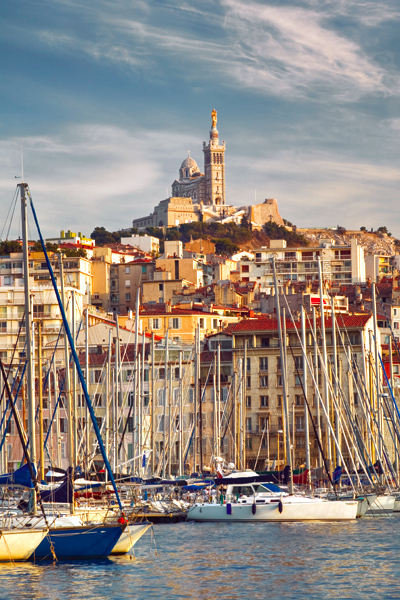Ports can challenge national stereotypes: think of the difference between St Petersburg and Russia, or Naples and Italy. Since England is so small, and London so big, few English ports have generated their own identities. In France, however, despite the alleged stranglehold of Paris, ports such as Bordeaux, Nice and Marseille have remained remarkably different in culture and character.
Of them all, Marseille is not only the oldest city in France — it was founded by Greeks in 600 BC — but also the most independent; in 1907 Jules Charles-Roux called it ‘a separate republic, neither national nor French’. Incredibly David Crackanthorpe’s wise, erudite and sensitive book on Marseille is the first in English. Although the city is comparatively near and has 300 days of sun a year, it is less familiar to most English people than Capetown.
Echoing a brilliant essay by Richard Cobb, Crackanthorpe sees Marseille’s main characteristics as secrecy, exuberance and — like many other Mediterranean ports — a preference for foreign over internal connections. From Louis XIV to Le Corbusier, Paris governments and planners have rarely been popular in Marseille. In 1660 Louis XIV entered Marseille through a breach in the walls, and built the forts of Saint Jean and Saint Nicolas to crush, as well as to protect, the city. Revolts were frequent. In 1871-6 the French government placed Marseille under a state of siege and in 1939 under ‘administrative tutelage’ .
The city was more successful in trade than in politics. One of the richest ports of the Roman empire, Massalia was known as ‘the Athens of the Gauls’. Petronius, author of the Satyricon, was born there. It recovered its ancient prosperity in the 17th century, largely though trade with the Ottoman empire, over which its chamber of commerce (the first established in France) was given a monopoly.
Ships were so tightly packed in the harbour that you could hardly see the water. However, many Marseillais, complained the intendant Arnoul to Colbert in 1666, would turn down the best deal not to miss a party in the surrounding villas: ‘Private interest and mutual distrust so divides them that I can say I have never met such people.’ The voice of the bureaucrat down the ages.
For Marseille, as for most French ports, the revolution and the empire were catastrophes. The city lost much of its trade and a fifth of its population. After a rebellion in 1793, the Paris government briefly renamed it ‘City without a name’. The 19th and early 20th centuries, however, were a golden age. The population grew from 130,000 in 1830 to 600,000 in 1914. It became the main port connecting France with Africa and Asia. Marseille firms made tiles for the roofs of the Levant and quays for its ports.
In much the same words that Naguib Mahfouz used about Alexandria, Joseph Joffo wrote of Marseille that it contained ‘a sense of joy, a quick, living air that took my breath away… a great, laughing fête’. No monuments of the past distracted from the pleasures of the present. The cafés and brothels of the vieux port were compared by André Suarès to ‘a giant sexual organ’; every house was a ‘hive of sex’.
In the years before 1914 governments were becoming more nationalistic. Marseille, however, like many other cities, including Vienna, Odessa, Constantinople, was becoming more cosmopolitan — suggesting the direction in which Europe could have evolved, but for the outbreak of the first world war. It had always had large numbers of Jews, Protestants and Italians. By 1914, 25 per cent of the population had a non-French origin, including Spaniards, Syrians, Armenians, above all ‘le clan des grecs’, whose ancestors had helped finance the Greek rising of 1821. They have now been replaced by Algerians, Africans and Asians. Marseille shows how dynamic and outward-looking French cities can be.
Crackanthorpe’s Marseille is a guide as well as a history. It has excellent photographs and chapters on topography, business dynasties (such as the Pastre, who treated trade between the Nile and the Rhône as their private domain), the city in literature, immigration, markets and the future. He writes vividly of the calanques or creeks along the coast and the ‘brilliant liquid maritime light’ which has helped make Marseille the subject of so many films, including The French Connection.
‘The Dark Side’ is the title of one chapter. The Figaro has called Marseille the national capital of fear and violence. In the ‘French Chicago’ gangsters who had ruled through drugs and sex often co-operated with the German occupation. As in other cities questions about local complicity in German war crimes — including the destruction of the vieux port — ‘will probably remain unanswered’. Allied bombs, for their part, were generally judged ‘unnecessary and ineffective’.
More than the world wars, Algeria haunts the city. An unpaid debt of Marseille merchants began the quarrel between the Dey of Algiers and the French government which helped trigger the French invasion of 1830 — and 132 years of occupation. Many murders of Arabs in the 1970s went unpunished.
Hopefully the 21st century will be happier than the last one. Relations between communities are better than in many Paris suburbs. The docks area is undergoing a process of ‘urban renewal’. Marseille plans to be ‘the Europort of the Mediterranean’. In 2013 it will be the the European Capital of Culture.
David Crackanthorpre convinces us that if any city in Europe can resist the advance of ‘international blandness’ and corporations, more deadening than decrees from Paris or Brussels, it will be Marseille. His book will make some readers want to go there at once.






Comments